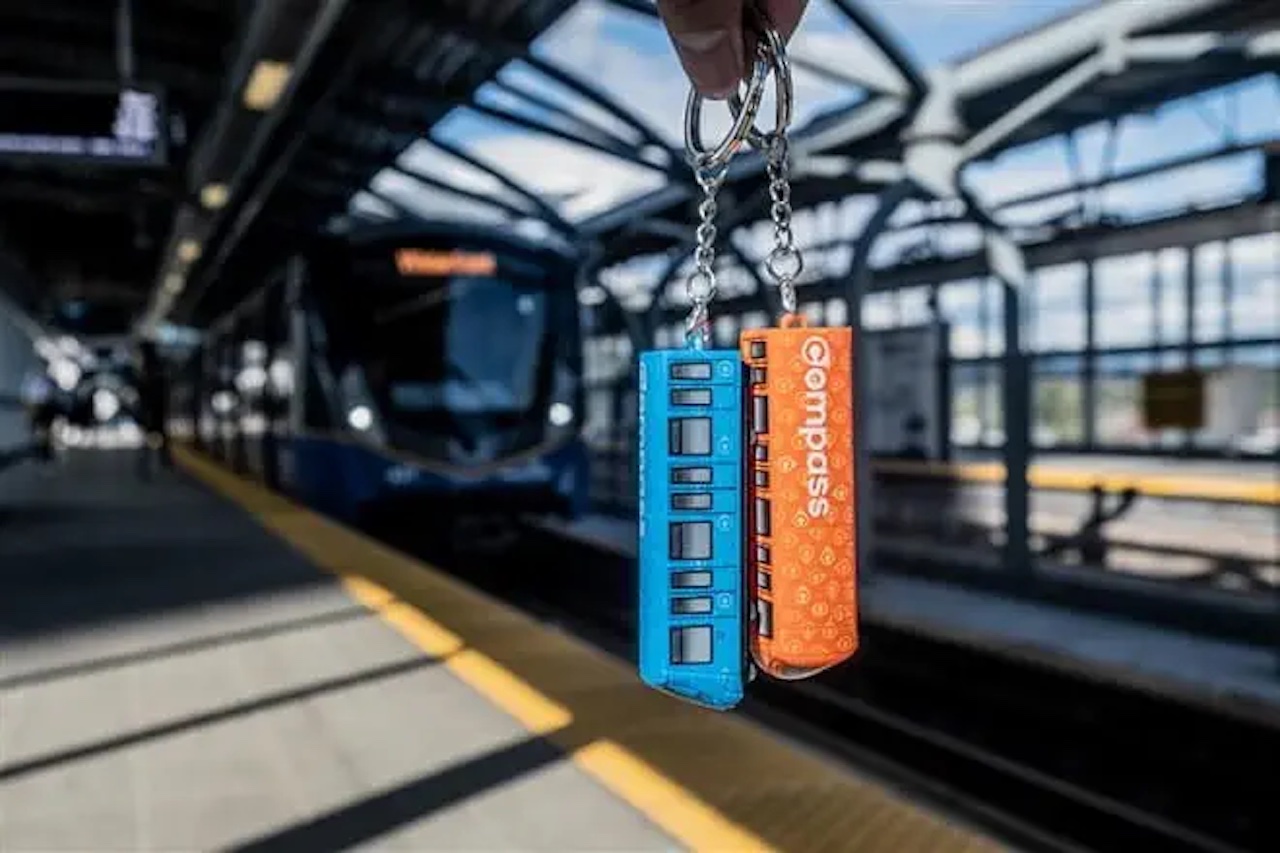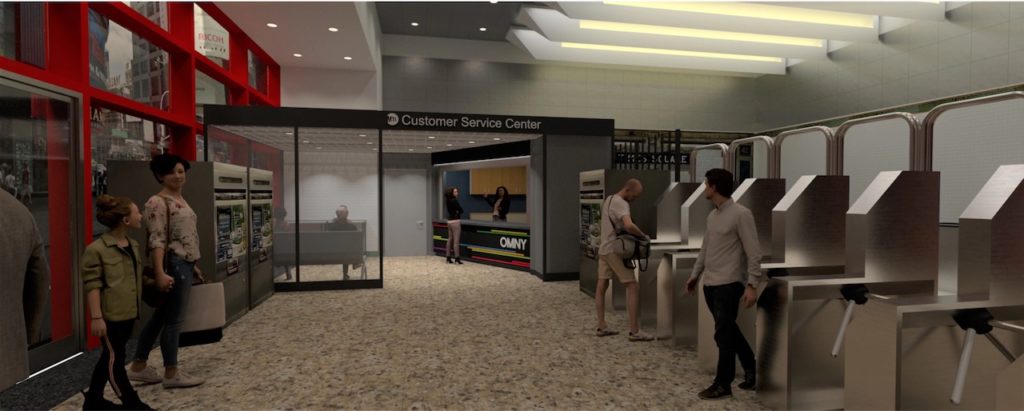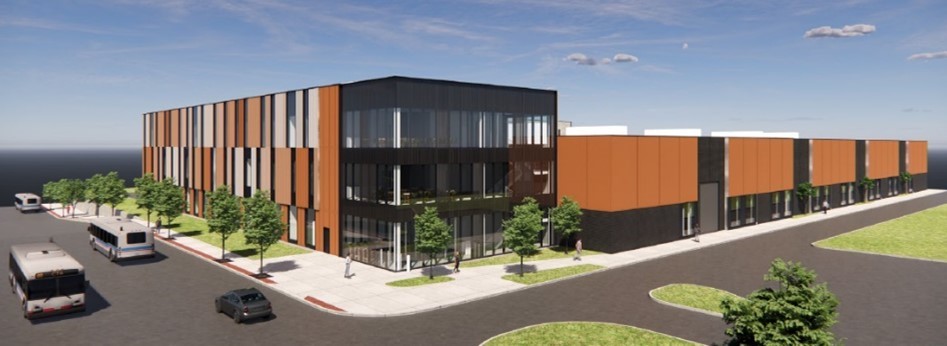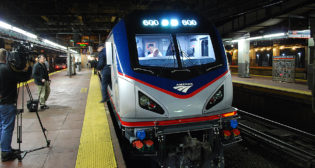
Transit Briefs: TransLink, NYMTA, Metra, CTA
Written by Carolina Worrell, Senior Editor
TransLink's Compass Mini-Trains attach to a keyring and offer an alternate way to pay for transit in Metro Vancouver.
TransLink launches Compass Mini-Train as an alternate way to pay for transit in Metro Vancouver. Also, the Metropolitan Transportation Authority (MTA) and Transport Workers Union (TWU) Local 11 unveil New York City subway Customer Service Centers; Metra approves contract to rebuild three electric line stations; and the Chicago Transit Authority (CTA) announces plans to develop a new Control and Training Center on Chicago’s West Side.
TransLink
TransLink on Dec. 14 launched the Compass Mini-Train, a small model SkyTrain that can attach to a keyring, as another way to pay for transit in Metro Vancouver. The Mini-Train, TransLink says, works like the Compass Card and Compass Wristband, but lights up when it is tapped.
The agency released 3,000 blue adult Mini-Trains and 2,000 orange concession Mini-Trains, which are available for purchase at the TransLink Customer Service Center inside Waterfront Station. Sales are limited to four Mini-Trains per person and, just like any other Compass product, there is a $6 refundable deposit when purchasing the Mini-Train.
Customers, TransLink says, can use their Compass Mini-Train to tap in and out when traveling on transit and reload online, at a Compass Vending Machine, by phone, or in person.
“The Compass Mini-Train is a new and exciting addition to the Compass product lineup,” says TransLink CEO Kevin Quinn. “Compass Wristbands and Minis have been very successful and I’m sure customers will appreciate the fun and quirky design of the new Compass Mini-Train.”
NYMTA
MTA and TWU Local 100 on Dec. 14 announced the opening of comprehensive Customer Service Centers in the subway system.

Designed to provide additional direct customer support in targeted, high-traffic subway stations, Customer Service Centers “will be a resource for assisting riders with OMNY use and Reduced-Fare support, among other customer needs,” the agency said.
Customer Service Centers, which builds on the announcement from MTA and TWU of the enhanced station agent role, with station agents supporting customer needs through work done outside of the booth, will open in six subway stations in early 2023, with nine additional stations expected to have the centers operating later in the year.
Customer Service Centers, which will be staffed by station agents 24/7 as part of the enhanced role and will be located within the physical premises of subway stations, will provide services historically provided by the MTA exclusively at 3 Stone Street in lower Manhattan in the neighborhoods where riders live. The centers will comprise of repurposed booths and new retail outlets and feature enhanced accessibility, OMNY technology, and “a dedicated, more welcoming visual presentation for customers” through new lighting, branded wrapping and canopies.
According to the MTA, station agents working at Customer Service Centers will be able to assist customers with switching to OMNY, including helping Reduced-Fare MetroCard customers switch to OMNY and providing applications to first-time Reduced-Fare customers. Additionally, Customer Service Centers will provide customers with information about how to submit complaints and receive updates and information on travel delays. Customer Service Centers will also be available to assist customers with wayfinding through the transit system. Agents working at Customer Service Centers will receive dedicated training on OMNY equipment and all dedicated customer service functions the centers will provide.
“Customer Service Centers will be a game changer for subway riders,” said New York City Transit (NYCT) President Richard Davey. “By bringing full-service customer service right to stations, we are making it easier than ever for customers to receive the support they need, from switching to OMNY to enrolling in the Reduced-Fare program. Customer Service Centers embody our North Star commitment to the customer experience at New York City Transit.”
“Customer Support Centers will bring comprehensive customer support directly to riders at the subway stations they use,” said MTA Acting Chief Customer Officer Shanifah Rieara. “By meeting customers where they’re at, we can enhance their experience, including with switching to OMNY, Reduced-Fare support, and assistance in collecting customer feedback.”
“Riders want customer service and stations that are staffed with people, not just OMNY card vending machines,” said TWU Local 100 Stations Vice President Robert Kelley. “The union wants to preserve and protect our Station Agents’ jobs into the future. These Customer Service Centers help achieve these goals.”
The first six planned Customer Service Centers will open in 2023 at the following subway stations:
- 161st Street – Yankee Stadium (4, B, D)
- 34th Street – Pennsylvania Station (1, 2, 3)
- Atlantic Avenue – Barclays Center (2, 3, 4, 5, B, D, N, Q, R)
- St. George (SIR)
- Coney Island – Stillwell Avenue (D, F, N, Q)
- Flushing – Main Street (&)
The second wave of nine Customer Service Centers will be rolled out over the course of 2023 at the following subway stations:
- Fulton Street (2, 3, 4, 5, A, C, J, Z)
- Myrtle – Wyckhoff Avenues (L, M)
- 74th Street – Jackson Heights – Roosevelt Avenue (7, E, F, M, R)
- East 180th Steet (2, 5)
- 125th Street (4, 5, 6)
- Fordham Road (4)
- Times Square – 42nd Street (1, 2, 3, N, Q, R, W, S)
- Sutphin Boulevard – Archer Avenue – JFK Airport (E, J, Z)
- 168th Street (1, A, C)
Metra
The Metra Board of Directors on Dec. 14 approved a $33.9 million contract to rebuild and make accessible the 79th, 97th and 103rd Street stations on the Metra Electric Line on the South Side of Chicago. The work is part of the multi-year, multimillion-dollar Metra Electric Community Initiative to transform 13 stations on the line.
According to Metra, the work at all three stations, which is expected to begin next summer, will include the demolition of existing stairs, headhouses, platforms and platform structures. The projects will provide new enclosed, ADA-accessible street-level entrances and lobbies, including elevators; new stairs and headhouses; new composite deck platforms; and new lighting, landscaping and signage.
The work, which was awarded to IHC Construction of Elgin, Ill., will be done in stages, requiring each station (no more than two at a time) to be closed for about seven months. The contract calls for one station to be closed and worked on for about three and a half months before the second station is also closed and worked on at the same time. After the second station has been closed and worked on for about three and a half months, the major work should be complete at the first station so it can reopen. After the first station is reopened, the third station then would be closed and worked on. IHC has committed to subcontracting 30% of the work to Disadvantaged Business Enterprise (DBE) firms. Metra is funding the work with its share of funding from the Rebuild Illinois capital program.
According to Metra, similar work is already under way at a fourth station on the line—the 147th Street/Sibley Boulevard Station. That work began in May 2022 and is expected to be complete next summer. An additional contract has been awarded for similar work at a fifth station—Homewood – with work expected to begin next spring.
“We are excited that our station renovation work is ramping up with this contract to upgrade three more stations on the Metra Electric Line,” said Metra CEO/Executive Director Jim Derwinski. “As part of our commitment to My Metra riders, we are prioritizing station improvements, in particular making stations accessible to persons with disabilities.”
CTA
CTA on Dec. 14 announced plans to develop a new Control and Training Center on Chicago’s West Side, “one of the largest investments in the area in decades and the latest achievement in Mayor Lori E. Lightfoot’s Invest South/West plan,” according to the agency.

The planned 150,000-square-foot facility, which will be located at the northeast corner of Lake Street and Pulaski Avenue in the West Garfield Park neighborhood, will house the CTA’s 24/7 Control Center, which oversees the operation of and communication with buses, trains and power on the rail system. Additionally, the new building will serve as CTA’s main training center for a wide range of operating, maintenance and customer-facing personnel.
“CTA choosing the Near West Side for their new Control Center Operations and Training Center is the latest example of how we are working together to modernize and provide better services for the city as a whole while revitalizing historically underinvested communities,” said Mayor Lightfoot. “This new project complements the ongoing Invest South/West program and is the latest local government facility to be constructed in the area, which together will help attract future economic development and job opportunities for this community.”
According to CTA, the new facility will replace the agency’s current, outdated operations center at Racine and Randolph, built nearly three decades ago. The existing facility, CTA adds, does not meet current security and threat standards, and is in need of costly infrastructure repair and capital investment.
Additionally, the new facility will provide adequate space for large-group training and employee orientation, space for which is not available in other CTA facilities. The building will house more than 250 CTA employees.
The awarding of this contract, which is not to exceed $158 million, represents the second largest City investment in the area in recent years, CTA said. The City of Chicago continues construction of the Chicago Police and Fire Training Academy about a mile away, on West Chicago Avenue in West Garfield Park.
According to CTA, funding for the project will come from multiple sources, including revenue stemming from the recent sale of CTA’s existing Control Center facility in the West Loop, as well as funding from Rebuild Illinois, the state’s infrastructure funding program, and CTA’s capital budget.
The CTA says it plans to enter into a development agreement with Sterling Racine, LLC, for design and construction of the new Control Center with construction scheduled to begin as early as April 2024, continuing through April 2026. The DBE goal for this project is 28% of the design-build construction costs.
“This project is a great example of how an investment in transit is an investment in the communities we serve,” said CTA President Dorval Carter, Jr. “Not only will we be constructing a new, modern facility that will improve our day-to-day operation of buses and trains, [but] it will also help generate new jobs and opportunities for those living and doing business within the surrounding community.”



